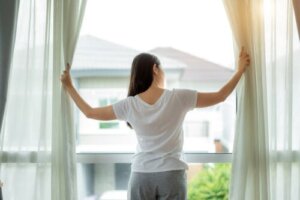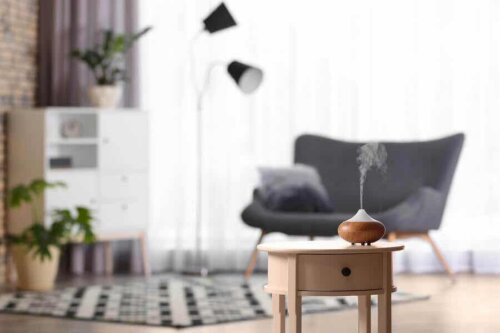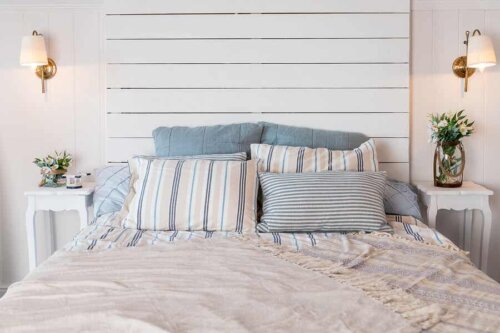The Importance of Fresh Air in the Home


Written and verified by the doctor Leonardo Biolatto
Ventilating the house to allow fresh air in is a habit our grandfathers and grandmothers considered important. Many people think it’s only to eliminate bad odors but it actually does a lot more.
For instance, many people smoke indoors. Also, people’s jobs keep them from cleaning the house as much as they’d like to. As you can imagine, it leads to the accumulation of certain gases that are harmful to your health.
In fact, the recent coronavirus pandemic led to a period of confinement in many countries. This situation forced everyone to stay indoors longer than usual.
Today’s article will explain the benefits of airing your immediate environment. We’ll also discuss how to do so effectively.
The importance of fresh air in the home

Ventilating your space is more important than you may think. As you already know, you eliminate toxic carbon dioxide from your body with every breath you take. This is one of the fundamental pillars.
Thus, not only does it accumulate when you don’t let fresh air in but also other harmful substances do as well, like tobacco smoke or those produced by cooking.
Likewise, this is even more important if you have a boiler or a stove, or a fireplace. Indeed, almost all appliances have an outlet but it’s common for part of the gases to accumulate indoors. This, of course, is detrimental to health.
Meanwhile, airing the house helps renews oxygen and regulates humidity. The same applies to bad odors, suspended particles, and even dust. These decrease when you ventilate and, thus, the environment improves.
Read about how An Air Purifier Can Help Against Pollen and Allergies
What happens when there’s no fresh air?
Improper ventilation can lead to health problems. First of all, it increases the risk of allergies and infections as it’s easier for dust and germs to accumulate.
In addition, letting the sunshine in eliminates a large number of microorganisms. Another thing to take into account is that we prevent the proliferation of mold by balancing the humidity in the room when we ventilate.
How to properly ventilate a place?

You can follow some simple tips to properly ventilate a room or the whole house. Furthermore, it’s important to take into account the season of the year, the humidity, and the temperature. This is because it’ll help you choose the best time of the day to do it.
In addition, the best thing to do is create a current throughout the house. That is, open the windows of all rooms at the same time if possible. Generally, a period of about ten or twenty minutes is enough to renew the air.
Find out How to Increase the Lighting in Your Workspace
It’s always best to air your bedroom right after you get up. In addition, wait for about 15 minutes before you make your bed so as to air the sheets.
During the winter, the best time to ventilate is in the morning or midday. This way the temperature won’t be as cold as it is at night. The opposite happens during the summer though. Keep in mind that the more people there are in a house, the longer you must ventilate it.
Finally, keep in mind that it isn’t good to keep some rooms continuously closed. In fact, you must ventilate frequently if someone smokes or if there’s a heating system on while you sleep.
All cited sources were thoroughly reviewed by our team to ensure their quality, reliability, currency, and validity. The bibliography of this article was considered reliable and of academic or scientific accuracy.
- Cincinelli A, Martellini T. Indoor Air Quality and Health. Int J Environ Res Public Health. 2017;14(11):1286. Published 2017 Oct 25. doi:10.3390/ijerph14111286
- WHO Guidelines for Indoor Air Quality: Selected Pollutants. Geneva: World Health Organization; 2010. Introduction. Available from: https://www.ncbi.nlm.nih.gov/books/NBK138700/
- Apte K, Salvi S. Household air pollution and its effects on health. F1000Res. 2016;5:F1000 Faculty Rev-2593. Published 2016 Oct 28. doi:10.12688/f1000research.7552.1
- Lo decía tu madre: “Hay que ventilar la casa”, ahora lo dicen los médicos | ICON | EL PAÍS. (n.d.). Retrieved May 5, 2020, from https://elpais.com/elpais/2018/07/17/icon/1531831976_182978.html
-
Seppänen O, Kurnitski J. Moisture control and ventilation. In: WHO Guidelines for Indoor Air Quality: Dampness and Mould. Geneva: World Health Organization; 2009. 3. Available from: https://www.ncbi.nlm.nih.gov/books/NBK143947/
This text is provided for informational purposes only and does not replace consultation with a professional. If in doubt, consult your specialist.








